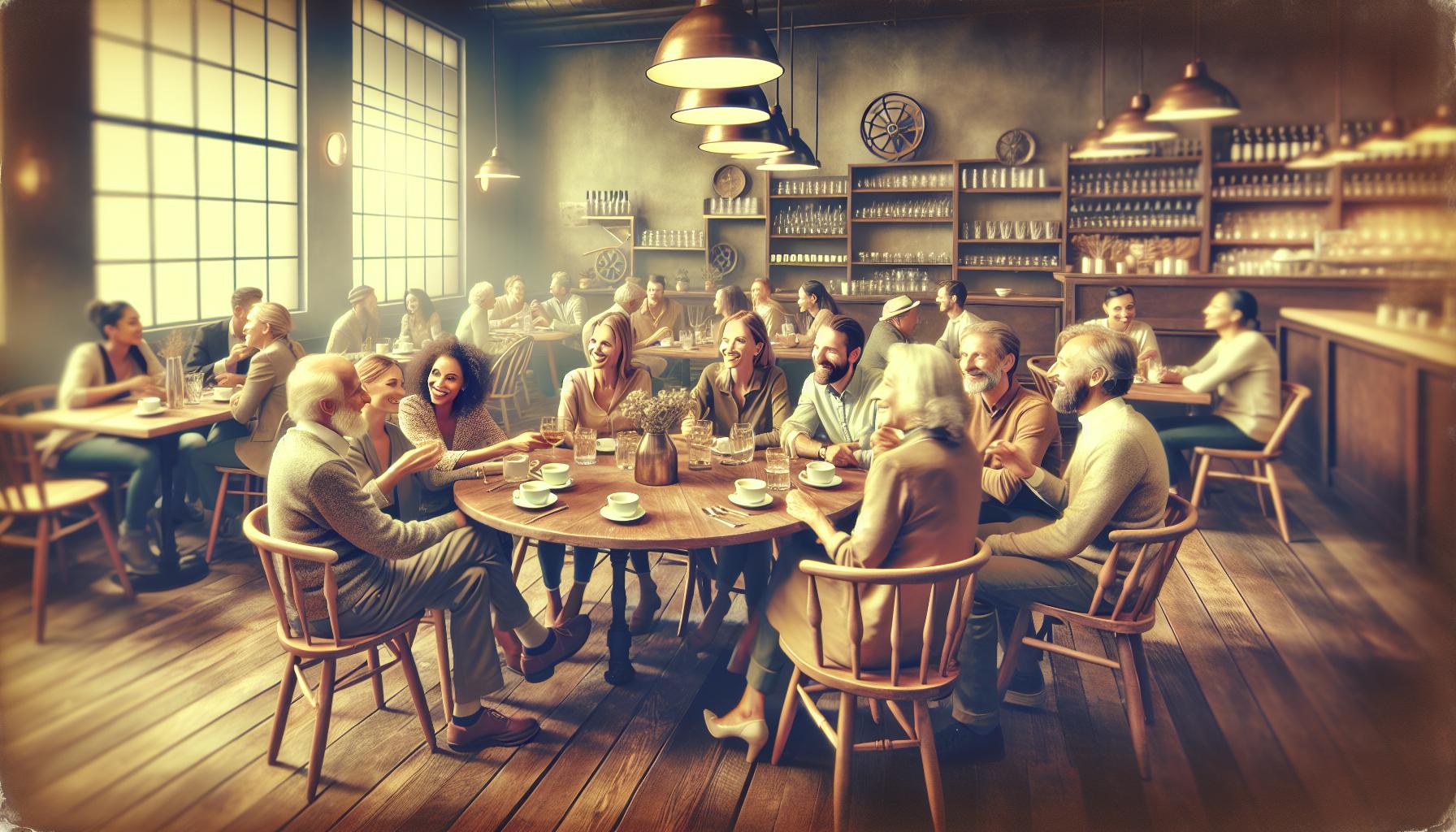Round cafe tables have become a staple in the café scene, offering a blend of style and functionality that appeals to both owners and patrons. Their unique shape fosters a sense of intimacy and encourages social interaction, making them ideal for casual gatherings. This article explores the reasons behind their popularity and how they enhance the overall café experience, proving that sometimes, the simplest designs make the biggest impact.
Key Takeaways
- Encourages Social Interaction: The circular shape of the round cafe table fosters a sense of intimacy and promotes face-to-face conversations among patrons.
- Space Efficiency: Round tables maximise seating capacity in smaller cafés, making them ideal for constrained spaces while optimising overall layout.
- Design Versatility: Available in various materials (wood, metal, glass) and sizes, round café tables can complement differing interior styles and accommodate both intimate and larger group settings.
- Flexible Arrangement Options: Their adaptable nature allows easy reconfiguration to cater to varying crowd sizes and special events, enhancing the overall café experience.
- Durability and Low Maintenance: Constructed from robust materials, round café tables withstand daily wear and tear, making them suitable for busy environments with minimal upkeep.
- Enhances Ambience: The inviting design of round tables contributes to a relaxed and welcoming atmosphere, improving the overall dining experience for customers.
Overview of Round Café Tables
Round café tables offer a combination of style, functionality, and versatility, making them a popular choice among café owners. Their circular shape fosters a sense of intimacy, encouraging conversation and social interaction among customers. This design promotes a relaxed atmosphere, allowing diners to engage easily with one another.
Round tables fit well in various café layouts, from small, cosy environments to larger, open spaces. They provide flexible seating arrangements, allowing for easy reconfiguration. Café owners can adjust the number of tables based on demand or move them to create pathways, increasing foot traffic and accessibility.
The aesthetics of round café tables also contribute to their popularity. They blend seamlessly with different interior styles, from modern to rustic. Available in various materials such as wood, metal, and glass, these tables can complement the overall theme of a café while enhancing its visual appeal.
Additionally, round café tables are often more space-efficient compared to square or rectangular alternatives. Their lack of corners allows for better flow in crowded areas. This characteristic maximises seating capacity in smaller cafés, creating an inviting space for patrons to enjoy their meals.
Aesthetic Appeal

Round café tables offer distinct aesthetic advantages that enhance the overall café environment. Their inviting shape creates a sense of warmth and encourages social interaction, making them an ideal choice for casual dining settings.
Design Versatility
Round café tables are available in multiple materials, including wood, metal, and glass. This variety allows them to match different interior design themes, from rustic to modern. They also come in various sizes, making it easy for café owners to find options that suit their specific spaces. These tables work well in both intimate two-person settings and larger group configurations, providing flexibility in layout and design.
Enhancing Ambience
The circular design of these tables contributes to a more relaxed atmosphere. Unlike rectangular tables that can feel imposing, round tables promote a sense of equality among diners. This shape encourages conversation, making it easier for guests to engage with one another. As such, round café tables help create a welcoming and approachable setting that enhances the overall dining experience.
Space Efficiency
Round café tables optimise space, making them ideal for diverse café layouts. Their compact shape enables them to fit snugly in small areas, allowing cafés to maximise seating without sacrificing comfort.
Ideal for Small Spaces
Round café tables excel in providing seating solutions for limited areas. Their lack of sharp corners facilitates tighter arrangements, reducing wasted space. In places where every square metre counts, a round table can provide access for customers while promoting a sense of openness. For instance, a small café with limited floor space can accommodate several round tables, enabling more customers to enjoy the atmosphere.
Flexible Arrangement Options
Round café tables offer adaptable seating configurations, enhancing overall functionality. They can be easily rearranged to suit varying crowd sizes or special events. For example, combining multiple round tables creates larger communal spaces, fostering community interaction. Their design allows for easy movement and reconfiguration, making it simple for café owners to adjust layouts based on current demand or layout preferences. This flexibility encourages efficient use of space, significantly improving customer experience.
Functionality and Usability
Round café tables play a crucial role in enhancing functionality and usability within café environments. Their unique shape not only optimises space but also caters to a wide range of customer needs, making them a preferred choice for café owners.
Encouraging Social Interaction
Round café tables naturally facilitate social interaction. The absence of corners creates an inviting atmosphere, allowing diners to engage more freely. This design promotes face-to-face conversations, making it easier for groups to connect. Staff can also navigate around these tables more efficiently, enhancing service delivery while creating a relaxed environment that encourages patrons to linger longer.
Suitable for Various Settings
Round café tables fit well across different settings and layouts. Their compact design allows for flexible arrangements, from intimate corners in small cafés to open areas in larger establishments. Depending on customer demand, these tables can be rearranged effortlessly, adapting to different group sizes or events. This versatility increases seating capacity and ensures efficient use of space, making round tables a practical choice for any café design.
Durability and Maintenance
Round café tables offer significant advantages in durability and maintenance, making them ideal for busy café environments. Their robust construction withstands daily wear and tear, ensuring a long lifespan.
Material Choices
Round café tables are available in multiple materials like wood, metal, and plastic, each contributing to their durability.
- Wood: Solid wood tables resist damage well and provide aesthetic appeal. Proper sealing and finish protect them from moisture and stains.
- Metal: Metal tables, especially those made from stainless steel, offer exceptional strength and corrosion resistance. They require minimal upkeep, making them suitable for outdoor settings.
- Plastic: High-quality plastic tables are lightweight and resistant to scratches. They’re easy to clean and often suitable for outdoor use.
Longevity Considerations
Longevity depends on consistent maintenance and material quality.
- Weatherproofing: For outdoor tables, weather-resistant finishes extend their life.
- Regular Cleaning: Routine cleaning prevents the buildup of dirt and grime, preserving their finish.
- Care for Surfaces: Attention to scratches and stains maintains appearance, particularly for wood and plastic surfaces.
By focusing on these aspects, round café tables not only satisfy durability needs but also simplify maintenance tasks, enhancing their appeal to café owners.
Conclusion
Round café tables stand out as a top choice for cafés due to their blend of style and functionality. Their inviting design encourages social interaction and creates a warm atmosphere that draws customers in. The versatility of these tables allows them to adapt to various layouts and group sizes, making them ideal for both intimate settings and larger gatherings.
Moreover their durable construction ensures they withstand the rigours of daily use while remaining easy to maintain. This combination of aesthetics and practicality not only enhances the customer experience but also benefits café owners. As cafés continue to evolve in their approach to design and customer engagement round tables will likely remain a staple in creating welcoming and dynamic environments.
Frequently Asked Questions
What are the benefits of using round café tables?
Round café tables promote social interaction by creating a relaxed atmosphere, making them ideal for casual gatherings. Their unique shape allows for better communication among diners, fostering a sense of intimacy. Additionally, they are versatile and fit various layouts, enhancing overall café accessibility.
How do round tables improve space efficiency in cafes?
Round tables optimise seating in tight spaces due to their compact shape and lack of sharp corners. They can be easily rearranged to accommodate changing customer needs, making them practical for both large and small café environments while maximising seating without sacrificing comfort.
What materials are round café tables typically made from?
Round café tables are commonly crafted from wood, metal, and plastic. Solid wood offers aesthetic appeal and durability, while metal tables, especially stainless steel, are strong and low-maintenance. High-quality plastic tables are lightweight, scratch-resistant, and perfect for outdoor use.
How durable are round café tables?
Round café tables are designed to withstand daily wear and tear. Materials like solid wood and metal provide exceptional strength, while weatherproof options for outdoor use ensure longevity. Regular maintenance, such as cleaning and surface care, further enhances their lifespan.
Why are round café tables popular among café owners?
Café owners favour round tables for their stylish appearance, functionality, and flexibility. They enhance customer interaction, contribute to a relaxed environment, and allow easy adjustments to seating arrangements, which increases foot traffic and optimises overall café layout.



